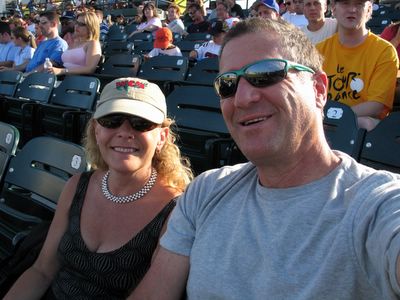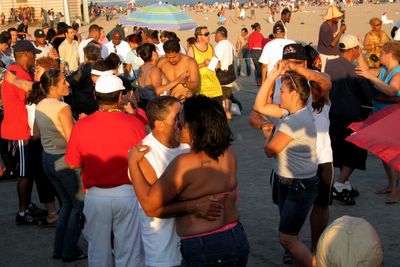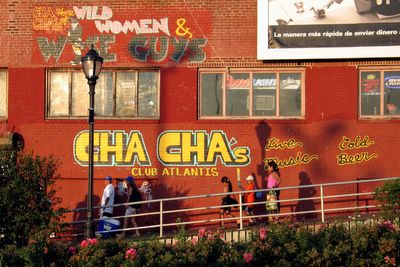Our friends Tamar and Jay couldn't make a Cyclone's baseball game at the new Keyspan ball park in Coney Island. They have season tickets. Would we like the tickets for Sunday afternoon?
Stacey and I looked at each other - we're not big baseball fans. But the idea intrigued us nonetheless. And we were going to be down by the shore anyway - Sophie, our friends' granddaughter, was to be the star of her first birthday party and we were invited. We accepted the offer of free tickets. There's something very appealing about sitting in a ball park on a warm Summer afternoon - and the Keyspan park has the added attraction of a cooling ocean breeze that picks up late in the day - a beautiful place to watch the game and enjoy the ocean air.

Keyspan Park - adjacent to the Coney Island boardwalk and beach.
Coney Island was jammed - with people and cars. Parking was not to be had in the lot adjacent to the park so we drove several blocks away and finally located a not-easy-to-find spot. As we walked back to the park we noticed that the city had built a spiffy new park but hadn't done much (or anything) for the neighborhood surrounding it. So what else is new? Coney Island is one of Brooklyn's poorest and most-underserved communities and it's been that way for decades. Development, from my experience, proceeds only if it benefits the wealthy. With the new Supreme Court declaration on the right of cities to use (abuse) eminent domain on behalf of private developers I suspect that will be the case even more in the future.
The Coney Island community is Latino and African-American but the crowd inside the park was virtually all white - another contradiction. Who were these people and where did they come from? And how does that whole racial separation system work? Then I thought about the Mayor and his obsession with building ball parks on Manhattan's west side and in downtown Brooklyn and how an ordinary New Yorker can't even buy Jets tickets for years because they're all sold out to wealthy season ticket holders. Seems to me that the sports industry is pretty much like the rest of our society - profits before people. It's the market, stupid!
Enough analysis. Now for the game, itself. The Cyclones, and this is only the second game I've seen so I don't pretend to be an expert, do not play very well. Lots of errors, very few hits and even less runs. Compared to the team they were playing - the Jamestown, NY Jammers - well, there was no contest. The latter, the farm team of the Miami Marlins, played like pros; our hometown team, farm team of the NY Mets, like high school amateurs. Final score was 6-3, Jammers.

A beautiful Keyspan Park, complete with ocean breezes.

Stacey and Matt at a Coney Island ball game.

The lights go on as the sun goes down. Ocean in the distance. Nice.

Fabulous backdrop - the old parachute jump of yesteryear - now just a Coney landmark.
We left at inning eight - it wasn't fun any more. The Cyclones were getting whooped and the outcome was predictable. We opted for a walk on the Boardwalk in the fading summer sun. It was mobbed with beachgoers and strollers and ... dancers! A Latino band was pumping out salsa and folks were jiving to the sound. Quite a sight.

Boogey on down the Coney Island Boardwalk.
We love our new neighborhood of Prospect Park. Culturally rich and diverse, it has "Brooklyn" written all over it. But one thing it lacks is the ocean, the beach and the boardwalk, whose three mile length I've biked and walked hundreds of times over the years that I lived down by the shore. Coney Island and its boardwalk have a proud history, immortalized in a PBS documentary several years ago. The wooden walkway's official name is the Riegelmann Boardwalk, so named for the Brooklyn Borough President, Edward Riegelmann. Here's what the NYC Parks Department has to say about its construction in 1921:
Once the BMT subway line reached the area in 1920, the pleasures of Coney Island were just a five-cent ride away from the steaming city. Attendance on a hot summer day could reach as high as a million, causing extreme congestion on the beach. Making matters worse, private concessions (such as beachfront hotels, bath houses, and cabarets) controlled large portions of the beach. As Brooklyn Borough President from 1918 to 1924, Edward Riegelmann (1869-1941) took charge of beautifying Coney Island and ensuring public access to the beach and shore. After the city secured title to property along the beachfront, the $3 million beach improvement and boardwalk construction began in 1921.
The immense engineering project required 1.7 million cubic yards of sand to add another 2.5 million square feet to the beach area. Construction of the boardwalk made use of 120,000 tons of stone, 7700 cubic yards of reinforced concrete, and 3.6 million feet of timber, including long leaf yellow pine for the flooring. From a height of 14 feet above the beach, the 80-foot wide boardwalk stretched from W. 37th Street to Ocean Parkway and provided easy access to both beach and concessions. "Coney Island's Fifth Avenue" opened with great fanfare on May 15, 1923.

Leaving the boardwalk after a day on the beach.
We left the boardwalk and walked past Nathan's - the famous hot dog emporium and couldn't resist that fabulous Brooklyn snack. Nathan Handwerker got a job at Feltman's in Coney Island in 1915. The latter, it is said, invented the hot dog in 1867 and built a huge hotel that catered to the wealthy. But Nathan had another idea and sold his hot dogs for five cents - half the price of Feltman's. History records that Nathans's is still here. Feltman? Who's he?
And so it goes on a lovely summer Sunday - baseball, politics, hot dogs, history and salsa on the boardwalk. Only in Brooklyn, New York.